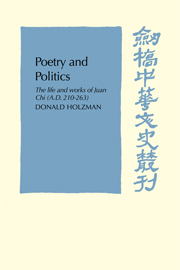Book contents
- Frontmatter
- Contents
- Dedication
- Preface
- Chinese Foreword by Jao Tsung-i
- List of Wei Emperors
- Introduction
- 1 The early Wei emperors
- 2 Tung-p'ing
- 3 Assassination and retreat
- 4 Anti-ritualism
- 5 Confucian essays and a strange understanding of Chuang-tzu
- 6 Society and solitude
- 7 The immortal woman
- 8 The pursuit of immortality
- 9 Mysticism
- 10 The Great Man
- 11 Poetry
- Conclusion
- Notes
- Bibliography
- Finding list
- Index
7 - The immortal woman
Published online by Cambridge University Press: 10 November 2010
- Frontmatter
- Contents
- Dedication
- Preface
- Chinese Foreword by Jao Tsung-i
- List of Wei Emperors
- Introduction
- 1 The early Wei emperors
- 2 Tung-p'ing
- 3 Assassination and retreat
- 4 Anti-ritualism
- 5 Confucian essays and a strange understanding of Chuang-tzu
- 6 Society and solitude
- 7 The immortal woman
- 8 The pursuit of immortality
- 9 Mysticism
- 10 The Great Man
- 11 Poetry
- Conclusion
- Notes
- Bibliography
- Finding list
- Index
Summary
We have seen Juan Chi in politics and in society. It is time now to look at him at home, to study his mystical tendencies, religious aspirations and his attitude towards Taoist immortality.
In the Chin shu 49, unfortunately the only source to record it, we read the following:
Juan Chi was an excellent performer on the zither. When he was satisfied [with what he had played] he would suddenly forget his physical being. Many of his contemporaries called him stupid, but his elder cousin, Juan Wen-yen, constantly admired him, thinking Juan Chi surpassed him. Thereafter all thought Juan Chi exceptional.
Although, in the original Chinese, the relation between Juan Chi's zither and his ‘forgetting his physical being’ is not made explicit, the relation between mystical rapture and zither (ch'in) playing is well attested, and, as we will see in a moment, Juan Chi himself has a semi-mystical view of music as something ‘beyond sound’. But, whether or not his ‘forgetting his physical being’ is the result of his music, it is highly significant. It can only be interpreted, in this context, as some kind of mystical experience, and the ‘stupidity’ Juan Chi was accused of may very well be some sort of docta ignorantia familiar to mystics from Lao-tzu 20 to Nicholas of Cusa.
- Type
- Chapter
- Information
- Poetry and PoliticsThe Life and Works of Juan Chi, A.D. 210–263, pp. 137 - 148Publisher: Cambridge University PressPrint publication year: 1977

